- Home
- J. A. Konrath
Flee, Spree, Three (Codename: Chandler Trilogy - Three Complete Novels) Page 27
Flee, Spree, Three (Codename: Chandler Trilogy - Three Complete Novels) Read online
Page 27
“Hurry up, dog.”
Another kick. Another yelp.
Hammett was on them in three long strides, letting her inner mean bubble to the surface.
“Ever hear that you need to be kind to dumb animals?”
The man scowled at her, not answering.
“Me, neither,” she said, raising her foot and violently kicking the codger above his right knee. His leg bent sideways at an unhealthy angle, and he fell onto the sidewalk, screaming and clutching his injury.
“Can I trust you to treat your dog better?” Hammett asked, bending over him.
“You crazy bitch!” He moaned and wailed and rolled around in a very unmanly way.
“Yes or no?”
“I’m calling the police!”
“I’ll take that as a no.”
The guy was old, so it didn’t take much effort to snap his neck. Just a firm two-handed grip under his chin, a foot on his back, and a solid yank.
Her anger momentarily sated, Hammett noticed a teenage girl at the bus stop across the street, staring slack-jawed at her. She scooped up the hound and marched over to the girl.
“You see what I did to that old guy?” Hammett said.
The girl nodded dumbly. Hammett handed her the dog, thrusting the squirming animal into the teenager’s arms.
“Treat this dog right, or I’ll do the same thing to you. Got it?”
Another quick nod.
“And don’t call the police.”
Quick nod.
“You have a boyfriend?”
Quick nod.
“He treat you good?”
Slower nod.
“If he doesn’t, just wait until he’s asleep. It’s easy to break their necks while they’re sleeping. Get a good grip first. Then use leverage and lean into it. Understand?”
Frantic nodding.
Hammett wondered how it had gotten to this point. After years as the top operative in the world, she’d been reduced to venting her frustration on dumb civilians and lecturing teens about boys and pet care. Pathetic, and monumentally inappropriate. It was reckless to kill people in public, and downright stupid to leave witnesses alive. Must be her foul mood. For a moment she considered eliminating the girl as well, which must have shown in her face because the teenager immediately slunk away, gripping the dog so tight its eyes bugged out. But the bus was approaching, and if Hammett killed the girl, she’d have to kill the driver, and then everyone riding, which might very well lead to her murdering the entire West Side. Better to quit now.
She stormed off, continuing west on Roosevelt until she reached Keeler, then went south. After a quick lap around the block to make sure she wasn’t being followed, she approached the large oak tree on the front lawn of her rental house and dug the door key out of a hidden notch in the bark. Then she walked slowly up to the porch, letting her senses report.
No unusual sounds or smells. The tiny strip of transparent tape Hammett had stuck between the door and the jamb at foot level was still in place, indicating no one had entered. No signs of entry on the front windows. The mailbox was empty, probably due to the note she’d stuck on it:
MAILMAN: NO FUCKING ADS OR I’LL SHOOT YOU.
A full mailbox meant a vacant house, which in this unsavory neighborhood meant burglars or squatters. Though, with the mood she was in, Hammett wouldn’t have minded if someone had broken into her home uninvited and was waiting inside. The blue-collar pig at the bar and the Humane Society reject had gotten her adrenaline up. Putting the hurt on some clueless jerk would have been pleasant.
Unfortunately, her house was as vacant as she’d left it. It was a split-level, enough room for a single family if they liked living cramped. Hammett hadn’t done any furnishing, other than the basics: weapons, first-aid kit, sleeping bag, several changes of clothing, towels, toiletries, some communications gear, non-spoiling food. She locked the dead bolt behind her when she entered.
The lights in the kitchen, set with a timer, were already on. Hammett considered a shower, but knew checking in was the priority. An encrypted cell phone was charging on the counter. She opened the freezer and took out a chocolate bar, nibbling on that while she punched in the activation code. Then she called the memorized ten-digit number.
“Al’s Plumbing,” someone answered in a digitally disguised voice.
“The toilet is clogged,” she said.
“No shit. You screwed up.”
“Victor screwed up.”
“Where is Victor now?”
Hammett frowned. “He’s clogging his own toilets, in hell. You should have taken out Chandler when you had the chance.”
“You said you could handle her.”
“She was a bit more”—Hammett searched for the right word—“determined than I’d anticipated.”
“She’s also still a player.”
Her sister was alive? Interesting. “Chandler won’t be a problem.”
“My sources also say another team has joined the party. They grabbed the transceiver.”
“How did they get the transceiver? It went overboard.”
“The ICU satellite feed. They were watching your little boating expedition. Sent in some frogmen and retrieved the device. But that’s not the priority. They also have the cripple. If she shows them how to use it…”
Hammett rubbed her face, wincing at the pain. This wasn’t good. “Where are they?”
“In transit. I believe they’ll take her to the nearest black site.”
“Cuba? Romania?”
“Wisconsin.”
Hammett’s frown deepened. She’d long since lost faith in her government, but operating a site on US soil was, well, egregiously unconstitutional. Even for duplicitous Uncle Sam.
“Do we have friends within the newcomer’s organization?” she asked.
“Negative. They’re NIC spooks. Can’t tell if they’re rogue or not. No one is claiming them.”
The National Intelligence Commission was the secret branch of Homeland Security, operating outside the NSA, CIA, and FBI, and it didn’t officially exist any more than did Hammett’s old agency, Hydra.
“I’ll need a team,” she said.
“I’ll see who’s in town. I’ll set up the meeting and call. Charlie foxtrot tango.”
Hammett checked her watch.
The shower would have to wait.
Chandler
“Sometimes you’ll be forced to make tough decisions,” the Instructor said. “They may turn out in your favor. They may turn out badly. You can live, or die, by the choices you make. But luck always plays a part. You can anticipate every move and execute perfectly, and luck could still kill you. Or you can make huge mistakes, and luck could save your ass. Don’t confuse having a plan with having control. Control doesn’t exist.”
I fell into darkness, anticipating five kinds of death.
I could break my neck on the elevator below me.
I could become caught in the counterweight and get dismembered, decapitated, or strangled.
I could bounce off the roof of the lift and fall down the shaft.
I could injure myself so badly I couldn’t continue, and eventually get discovered.
I could get caught between the car and the wall and be crushed.
But instead I fell for only a fraction of a second, then immediately hit the car and began to rise. The elevator had been less than three feet below me.
I rolled to my knees, trying to get my bearings, trying to shake the fear and the disorientation, trying to formulate some sort of plan.
I’d injured, but not killed, the agent in the hallway. If I got out of here, I could pay him a visit later and finish my questioning.
But I had very little chance of getting out of here.
I had no idea who these agents were, or what team they played for. But they were experienced, and there were a lot more than I had anticipated. If I didn’t escape from the hospital, they’d catch me.
I considered that option. I could give myse
lf up, and they’d take me to Fleming. But I’d also be giving up the advantage freedom gave me. A shark in the ocean has more options than a shark in the tank.
The elevator stopped abruptly. Made sense, since I’d been the one who’d called it to the sixth floor. This hospital only had six floors, which meant the roof was directly above me. It was too dark to see; I reached into the blackness, groping for a handhold. I found a metal bar to grab, and brought up a knee to hook around it. There should be an access panel to the roof. I felt around, touching old grease and grime and kicking up enough dust to clog my nostrils.
Beneath me, the elevator jostled.
A second later, tapping sounded on the walls, growing in force and volume. It morphed into a rhythm that vibrated the panel beneath me, and I didn’t have to guess who had entered the car.
My pulse was way beyond normal, but I continued to grope around for the roof access. I’d be damned if I’d give in to Rochester’s mind games, although I couldn’t deny he had me more than a little rattled. I’d fought for my life countless times—several in just the last few days—but I couldn’t remember any encounter where I’d been so thoroughly bested…except years ago during Hydra training, sparring with the Instructor.
Rochester had used a martial arts style I’d never encountered before, and I had no idea how to beat it. He’d played with me, not even breaking a sweat, and that scared me in a way I hadn’t felt in a long time.
To be at someone’s mercy, utterly helpless and without hope—the feeling was akin to drowning. And there was nothing I hated more than drowning. If I had to face him again—
The elevator hatch sprang open. Rochester smiled up at me.
“Where you going, sweet thing?”
He reached up a tattooed hand, seeking my ankle.
My throat closed, making it impossible to breathe. For a split second I shrank away, not knowing where to go, what to do. Then I realized that the light from the car illuminated the shaft. Looking up, I spotted the roof access less than two meters above. I tugged the handle, then jumped out just as Rochester’s thick fingers brushed my leg.
Pulling myself onto the hospital roof, I forced myself to think, to breathe, quickly getting my bearings. I was surrounded by a bed of tar paper, the edge of the building to the north, the El train rumbling past a few floors down, four aluminum mushroom-style vents to the east right in front of me. And beyond those—
A helicopter.
I could fly helicopters.
I sprinted toward it. Red-and-white fuselage, standard flying ambulance colors—the vehicle looked like an AStar B3 or equivalent. No one inside, and when I reached it, the door had been conveniently left open. So far, so good.
I sat in the cockpit, familiarizing myself with the controls, reaching for the battery switch and flipping it on.
Nothing happened.
I searched for the engine starter button, fearing the worst. Sure enough, the keyhole next to it was empty.
I did a quick, frantic search for keys, finding none, and then went into the cargo bay. It was also entirely lacking in keys, but my eyes locked onto a medevac gurney, complete with an attached lift harness. I scanned around and located the winch. Steel cable, maybe forty meters on the spool. Enough to get me to street level?
Only one way to find out.
I hit the release on the spool, attached the line to the eyehole on the cart, and opened the side door. My head was still throbbing, but my balance had returned. Still, I felt unsteady and overwhelmed. I had to get out of here before Rochester caught up.
Sweeping a glance in the direction of the elevator and stairs to make sure he wasn’t sneaking up on me, I rolled the gurney onto the roof and to the edge of the building. Once I’d lifted the cart up two feet and balanced it on the brick ledge, I ran back to the helicopter and adjusted the spool to slowly play out line, then returned to the gurney.
Here went nothing.
I pushed it off the edge of the building. It banged against the side, found its center, and then began to lower itself a few inches per second. I sat on the ledge, swung my legs over, and dropped onto the gurney, momentum almost pitching me forward and onto the ground below.
I regained my balance and squatted on the rubber mattress, holding on to the handrails. The aluminum scraped against brick, but it was pretty smooth going. In ten seconds I’d dropped about a meter, and as long as there was enough cable, and as long as Rochester didn’t figure out what I was doing, and as long as no agents thought to look up at me, I was home free.
Another elevated train passed beneath me, green and white and filthy, perhaps ten meters off the ground and three meters away from the side of the building. It squealed to a stop, and I watched some dude in a wheelchair exit the train and roll across the platform toward the hospital.
I continued my descent. Halfway down the building, and all was well. I was already beginning to formulate my plan for my return when the cable suddenly jerked to a stop, almost throwing me off.
I looked up, wondering if I’d misjudged the length. Then the gurney shook, and began to rise.
Rochester. He was reeling me back in.
I looked down. Still at least forty feet from the street below. But only twelve feet from the El tracks.
I didn’t think. I jumped.
While in the air, I remembered how Chicago’s elevated train system worked. It ran on electricity, transferred to the cars via a hot third rail, which delivered a deadly 600 volts. As I fell, I looked at the train tracks rushing up at me, brown wood and brown rust, spotting two of the rails but not the third.
Normally when I landed from a fall, I would roll to displace the force of impact. But rolling could mean brushing the third rail and a hot, jolting death. So I opened my ankles and turned my body so I fell between the rails, straddling one of them, which could have been the hot one.
I pitched forward, knees bending, spreading out my hands so I fell into a push-up position. But gravity and g-force were stronger than I was, and my chest bounced off the center rail.
It knocked the air out of me, but at least it didn’t fry me like a pork rind.
I manipulated my diaphragm, forcing air back into my lungs, and then pushed away from the rail with my arms. But my left palm slipped on the old wood, my arm dropping through the space between the railroad ties, my body weight jamming my elbow in the middle of them.
I tried to pull back.
Wood scraped tender skin. Stuck.
Tried harder.
Still stuck.
My bony elbow jutted out more than my biceps, and it was wedged between the slats pretty good. The tarlike odor of creosote clogged my throat, hot and blanket heavy. I thought about scooting forward, getting my knees under me for leverage, but there were rails on either side, one of them the widowmaker. Adjusting my footing didn’t seem wise.
“What you doin’ down there, girl?”
I looked up, saw Rochester was at the roof’s ledge, waving down at me.
The last thing I felt capable of was relaxation, but I forced myself to do it anyway. I closed my eyes. I slowed my heartbeat. Unbunched my muscles. Then slowly tried to turn my elbow to the side.
I turned until my humerus felt like it was going to splinter, until the skin felt like it was scraping off my bones, then tried to pull back again.
Still stuck.
“I’m coming for you, sweet thing.”
I chanced a look, saw Rochester riding the gurney down the side of the building, standing up proudly like Caesar on his chariot.
My trapped hand was going tingly, the circulation being cut off. I focused on turning my arm the opposite way, twisting until my muscles and tendons threatened to snap.
Pulled, hard and steady.
My elbow wouldn’t budge.
The tracks beneath me started to vibrate.
“Train is a-coming, girl,” Rochester called.
Heat swept over me, and my pulse jumped despite my efforts at achieving calm. I yanked with everythin
g I had.
My shoulder popped out, dislocating with a bursting sound and excruciating pain.
But my elbow remained trapped.
Vision going fuzzy, I carefully inched forward on my knees, avoiding the side rails. Besides feeling the train, I now also heard it, a low, steady grumble like an approaching storm.
“Better hurry,” Rochester said. I didn’t look at him, but he sounded close.
Blinking away tears, I gave my torso a violent jerk, snapping my shoulder back into place. Using the pain, I coughed up some congestion in my lungs, spat between the railroad ties onto my stuck elbow, and tried to work it up and down.
The El train was impossibly loud now, practically upon me.
I stretched my whole body backward, like a reverse mousetrap. My elbow slid, just a little, then a little more. The spit lubrication working, my arm came loose, inch by inch. The train’s thunder grew deafening, the tracks shook as if tossed by an earthquake. I wasn’t going to make it. Even as I pulled my arm free, I could feel the train bear down—
—and pass me by, on the other side of the tracks.
I lost control of my emotions for a moment, a hysterical laugh escaping my lips, amazed that I was free and not a train version of roadkill. Then I carefully climbed to my feet just as someone jumped onto the tracks in front of me.
“You goin’ somewhere?”
I tried to raise my fists, but my left arm wouldn’t cooperate.
“Ah…you can’t use one arm. That’s OK. Rochester wouldn’t take advantage of such a pretty lady.”
Rochester grinned wide, then held his left arm behind his back.
I really hated this asshole.
He moved in fast, feet nimble on the railroad slats, avoiding the rails. Bobbing his head, slapping his neck and chest with his right palm in that rhythm I’d grown to loathe, he got within striking distance and threw a jab at my head. I pulled away, but his punch was a feint, and he extended into an uppercut, catching me under the chin.
I staggered backward, losing my footing, falling to the left, my foot touching a rail—
No shock. I’d gotten lucky.
Even luckier, I now knew which rail was the hot one.

 What Happened to Lori
What Happened to Lori Shot Girl
Shot Girl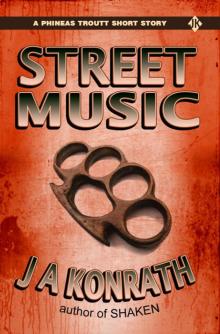 Street Music
Street Music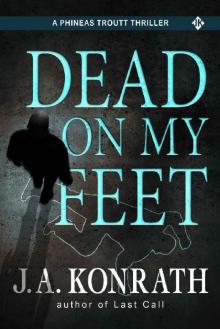 Dead on My Feet
Dead on My Feet What Happened To Lori - The Complete Epic (The Konrath Dark Thriller Collective Book 9)
What Happened To Lori - The Complete Epic (The Konrath Dark Thriller Collective Book 9)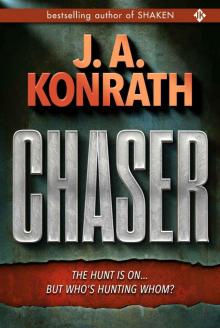 Chaser
Chaser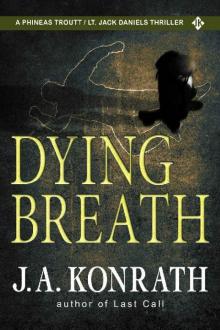 Dying Breath - A Thriller (Phineas Troutt Mysteries Book 2)
Dying Breath - A Thriller (Phineas Troutt Mysteries Book 2) Jack Daniels Six Pack
Jack Daniels Six Pack Jacked Up! (A Lt. Jack Daniels/Leah Ryan Mystery)
Jacked Up! (A Lt. Jack Daniels/Leah Ryan Mystery)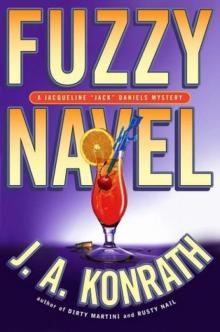 Fuzzy Navel
Fuzzy Navel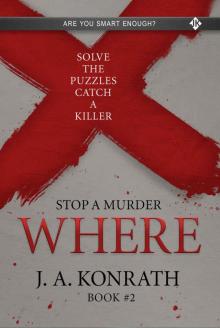 STOP A MURDER - WHERE (Mystery Puzzle Book 2)
STOP A MURDER - WHERE (Mystery Puzzle Book 2) Epitaph
Epitaph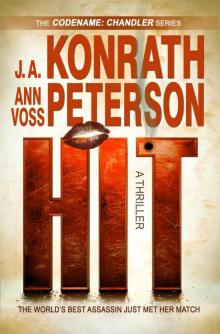 Hit: A Thriller (The Codename: Chandler)
Hit: A Thriller (The Codename: Chandler) Cheese Wrestling: A Lt. Jack Daniels/Chief Cole Clayton Thriller
Cheese Wrestling: A Lt. Jack Daniels/Chief Cole Clayton Thriller Shapeshifters Anonymous
Shapeshifters Anonymous STOP A MURDER - HOW (Mystery Puzzle Book 1)
STOP A MURDER - HOW (Mystery Puzzle Book 1) Bloody Mary
Bloody Mary Dying Breath
Dying Breath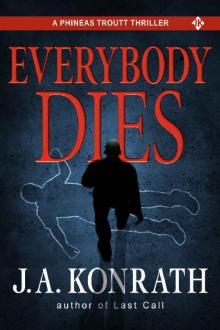 Everybody Dies - A Thriller (Phineas Troutt Mysteries Book 3)
Everybody Dies - A Thriller (Phineas Troutt Mysteries Book 3) DRACULAS (A Novel of Terror)
DRACULAS (A Novel of Terror) Shot of Tequila
Shot of Tequila Last Call - A Thriller (Jacqueline Jack Daniels Mysteries Book 10)
Last Call - A Thriller (Jacqueline Jack Daniels Mysteries Book 10) Holes in the Ground
Holes in the Ground![Shaken [JD 07] Read online](http://i1.bookreadfree.com/i1/04/01/shaken_jd_07_preview.jpg) Shaken [JD 07]
Shaken [JD 07]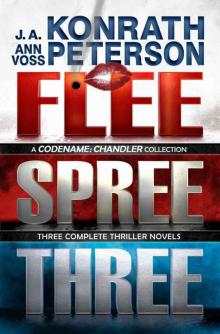 Flee, Spree, Three (Codename: Chandler Trilogy - Three Complete Novels)
Flee, Spree, Three (Codename: Chandler Trilogy - Three Complete Novels) Draculas
Draculas Jack Daniels Stories
Jack Daniels Stories Wild Night is Calling
Wild Night is Calling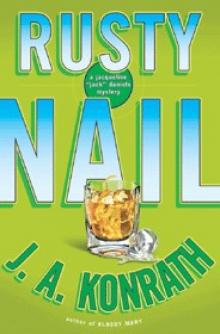 Rusty Nail
Rusty Nail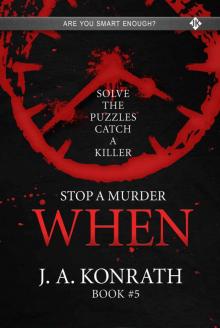 STOP A MURDER - WHEN (Mystery Puzzle Book 5)
STOP A MURDER - WHEN (Mystery Puzzle Book 5) Whiskey Sour
Whiskey Sour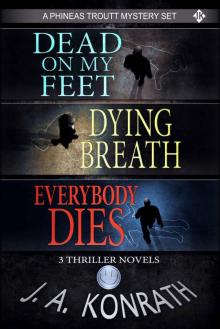 Phineas Troutt Series - Three Thriller Novels (Dead On My Feet #1, Dying Breath #2, Everybody Dies #3)
Phineas Troutt Series - Three Thriller Novels (Dead On My Feet #1, Dying Breath #2, Everybody Dies #3)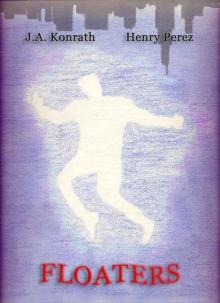 Floaters - A Jack Daniels/Alex Chapa Mystery
Floaters - A Jack Daniels/Alex Chapa Mystery J.A. Konrath / Jack Kilborn Trilogy - Three Scary Thriller Novels (Origin, The List, Haunted House)
J.A. Konrath / Jack Kilborn Trilogy - Three Scary Thriller Novels (Origin, The List, Haunted House)![Shaken (Jacqueline Jack Daniels Mysteries) [Plus Bonus Content] Read online](http://i1.bookreadfree.com/i2/04/10/shaken_jacqueline_jack_daniels_mysteries_plus_bonus_content_preview.jpg) Shaken (Jacqueline Jack Daniels Mysteries) [Plus Bonus Content]
Shaken (Jacqueline Jack Daniels Mysteries) [Plus Bonus Content]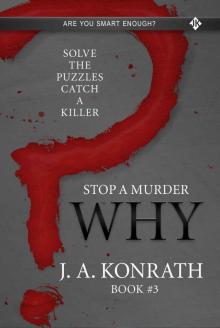 STOP A MURDER - WHY (Mystery Puzzle Book 3)
STOP A MURDER - WHY (Mystery Puzzle Book 3)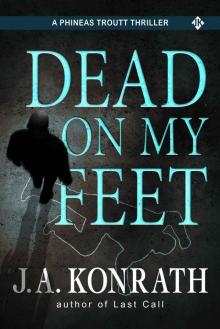 Dead On My Feet - A Thriller (Phineas Troutt Mysteries Book 1)
Dead On My Feet - A Thriller (Phineas Troutt Mysteries Book 1) Cherry Bomb
Cherry Bomb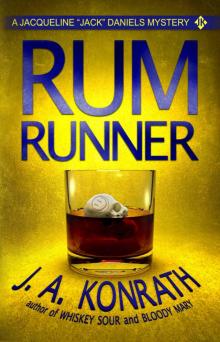 Rum Runner - A Thriller (Jacqueline Jack Daniels Mysteries Book 9)
Rum Runner - A Thriller (Jacqueline Jack Daniels Mysteries Book 9) With a Twist
With a Twist Dirty Martini
Dirty Martini Naughty
Naughty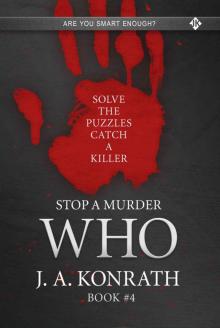 STOP A MURDER - WHO (Mystery Puzzle Book 4)
STOP A MURDER - WHO (Mystery Puzzle Book 4)